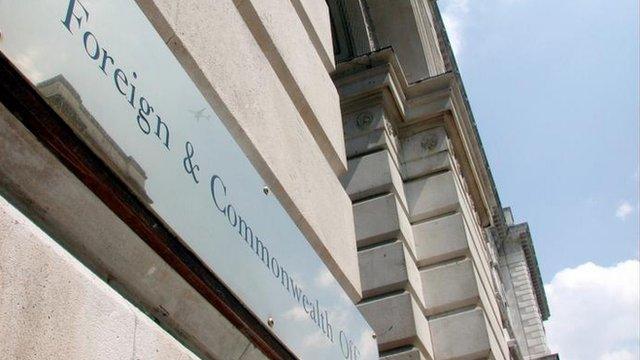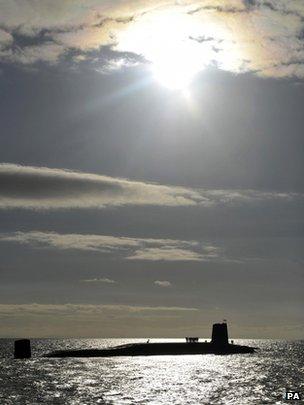Scottish independence: Who loses, who wins on foreign affairs?
- Published

Foreign and Commonwealth affairs are being brought into the independence debate
Turn things round. Ask not what Scotland does or does not get from the Union. Ask what benefits accrue to England.
Already, I discern Nationalists leaping to their feet and declaring: "All that volatile oil". But set aside for a moment the argument as to where the balance of economic interests lies.
Consider foreign policy. Consider global strategy. Consider status. These and other matters feature in a report from the Commons Foreign Affairs Committee, external.
The substance of their conclusion is that there would be many uncertainties and problems associated with independence in the areas of the EU, wider diplomatic links, intelligence and the prosecution of foreign policy aims.
They complain, further, that "seemingly unfounded assertions" are being presented as "incontrovertible facts" in pursuit of political objectives.
Nicola Sturgeon: "We want to see Trident removed from Scotland as quickly as possible."
Nicola Sturgeon, the deputy first minister, was on the wireless this morning talking about the MPs' efforts.
She questioned the selection of evidence and noted that their endeavours were scarcely detached in that they all belonged to parties adhering to the Union and decrying independence.
So much, so familiar. Those advocating the Union pose doubts about the independence project - which is in keeping with their overall strategy.
Those advocating independence condemn such comments as baseless scare-mongering - which is in keeping with……..you get the concept.
Fresh start
But look a little further into the report, particularly the nuanced analysis of what might happen to the remainder of the UK (RUK). (Last week's Treasury report spoke of, external the "continuing UK", thus asserting the legacy role which today's report says is probable.)
The MPs on the Select Committee conclude that it is not in the gift of either government, RUK or Scotland, to declare unilaterally what would happen to the rights and responsibilities of the current state: how they would be apportioned.
However, they note that the preponderant view is that the RUK would be very much in the lead, not least in global opinion - while Scotland would have to start anew. They posit problems associated with that fresh start, not least with regard to EU membership.

The SNP government says it would want to see Trident go in the event of independence
But look further still. The report also comments upon the status of the remainder of the UK, noting that it might not stay entirely unchanged.
In particular, they speculate as to whether there would be a change in its power profile. Might there, for example, be a challenge to Britain's current position as a permanent member of the United Nations Security Council? (Regular readers of these meanderings will have seen that point raised before.)
Might such a diminution of status particularly apply in the event that Scottish independence prompted a challenge to the nuclear weapons deployed from these islands, at Faslane? Might other states regret and deplore such a change?
Further, might the RUK face alterations to the rules governing the current UK's membership of the European Union? It would seem evident, at the very least, that a smaller state, which the rest of the UK would be, might expect fewer MEPs and budgetary changes.
To be clear, the bulk of the report deals with challenges and problems which the MPs see accruing to an independent Scotland.
They presume, to a large extent, that RUK could continue unsullied.
UK goodwill
But they do pose the questions. They posit - but largely discount - the possible loss of "soft power" or status from a dissolution of the existing UK.
They posit - and examine - the possible loss of "hard power" or Trident, with a concomitant impact upon foreign policy, not least among anxious allies.
And they speculate about possible trade-offs. If Scotland were to back rest of the UK as the continuing state in the UN, then they reckon that Scotland's application for UN membership would be "swift and unproblematic".
Is there another trade-off? The report notes how unwelcome unilateral nuclear disarmament would be to RUK, adding that it would have "a significant effect on the willingness of the UK to co-operate on other issues upon which Scotland may need assistance".
The report notes further that the commitment of the Scottish government to remove Trident is "not in question. So, might that mean that the RUK goodwill would be dependent upon a flexible timetable re Trident? Perhaps, as the committee notes, deferring the goal of a nuclear-free Scotland for a generation.
Ms Sturgeon's point was that the Scottish government and SNP were "responsible" politicians who would not pursue a course that was hazardous. In such circumstances, might Trident - or, more precisely, the related timetable - be a bargaining counter should independence arise?